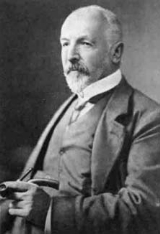
mathematician
, best known as the inventor of set theory
, which has become a fundamental theory
in mathematics. Cantor established the importance of one-to-one correspondence between the members of two sets, defined infinite and well-ordered sets
, and proved that the real number
s are "more numerous" than the natural number
s.
In re mathematica ars proponendi pluris facienda est quam solvendi.![]()
I realize that in this undertaking I place myself in a certain opposition to views widely held concerning the mathematical infinite and to opinions frequently defended on the nature of numbers.![]()
Had Mittag-Leffler had his way, I should have to wait until the year 1984, which to me seemed too great a demand!![]()
There is no doubt that we cannot do without variable quantities in the sense of the potential infinite. But from this very fact the necessity of the actual infinite can be demonstrated.![]()
The potential infinite means nothing other than an undetermined, variable quantity, always remaining finite, which has to assume values that either become smaller than any finite limit no matter how small, or greater than any finite limit no matter how great.![]()
Er ist aber in Kopenhagen geboren, von israelitischen Eltern, die der dortigen portugisischen Judengemeinde.![]()

